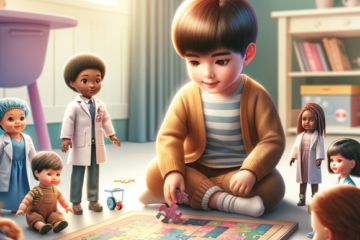Introduction
In a world marked by diversity and complexity, fostering empathy and understanding is crucial for creating a harmonious society. One avenue through which these qualities can be nurtured is the use of dolls. Beyond mere playthings, dolls serve as powerful tools for children to engage with different perspectives, cultures, and realities. This article delves into the profound impact that dolls can have on promoting empathy and broadening children’s understanding of the world around them.
Understanding Empathy
Empathy, the ability to understand and share the feelings of others, is a fundamental aspect of human interaction. It enables individuals to connect with others on a deeper level, fostering compassion and kindness. Developing empathy begins in childhood, making it essential to introduce children to experiences that cultivate this trait early on.
Dolls as Mirrors of Diversity
Dolls come in various shapes, sizes, and ethnicities, mirroring the rich tapestry of human diversity. By playing with dolls representing different races, cultures, abilities, and socioeconomic backgrounds, children are exposed to a spectrum of human experiences. This exposure helps dismantle stereotypes and biases, fostering a more inclusive worldview.
Learning Through Play
Play is the language of childhood, and dolls serve as catalysts for imaginative play. When children engage in role-playing scenarios with dolls, they step into different perspectives, experiencing the world through the eyes of others. Whether it’s caring for a doll with disabilities or role-playing familial dynamics different from their own, children learn empathy by walking in someone else’s shoes, even if those shoes are miniature and made of plastic.
Building Emotional Intelligence
Dolls provide a safe space for children to explore complex emotions and interpersonal relationships. Through nurturing and caring for their dolls, children develop emotional intelligence, learning to recognize and respond to the feelings of others. This emotional literacy is essential for fostering healthy relationships and navigating social dynamics throughout life.
Facilitating Difficult Conversations
Dolls can also serve as conversation starters for challenging topics such as illness, loss, or discrimination. By incorporating diverse dolls into play, parents, educators, and caregivers can broach these subjects in a gentle and age-appropriate manner. This approach helps children develop empathy and resilience while equipping them with the tools to navigate life’s complexities with compassion and understanding.
Promoting Cultural Competence
In an increasingly interconnected world, cultural competence is vital for navigating diverse communities and workplaces. Dolls offer a tangible way for children to learn about different cultures, traditions, and customs. Through play, children develop an appreciation for cultural diversity, laying the foundation for respectful and inclusive interactions with people from all walks of life.
Conclusion
In the hands of a child, a doll is more than just a toy—it’s a gateway to empathy, understanding, and connection. By embracing dolls as tools for learning and growth, we empower children to become compassionate global citizens who appreciate the beauty of human diversity. As we continue to harness the power of play to shape the next generation, let us recognize the profound role that dolls play in promoting empathy and fostering a more inclusive and understanding world.



0 Comments